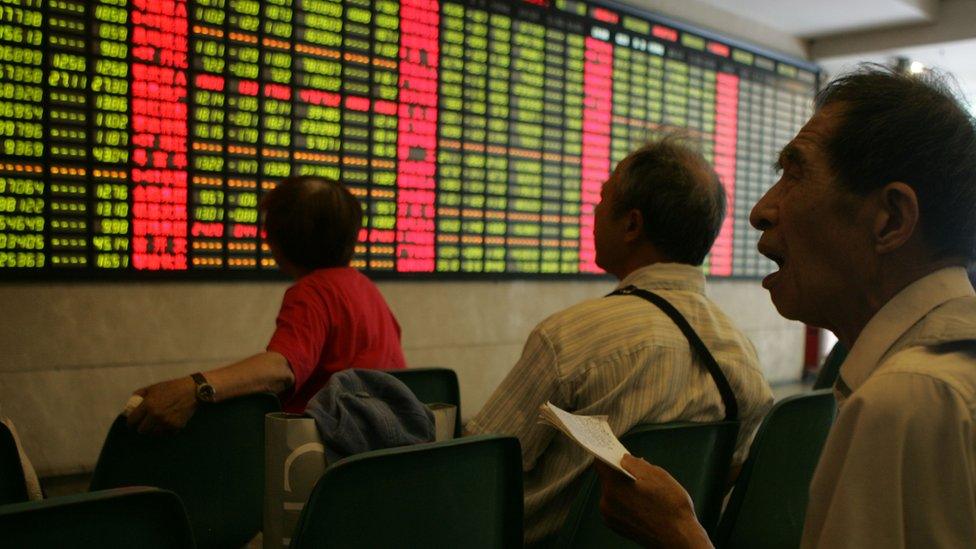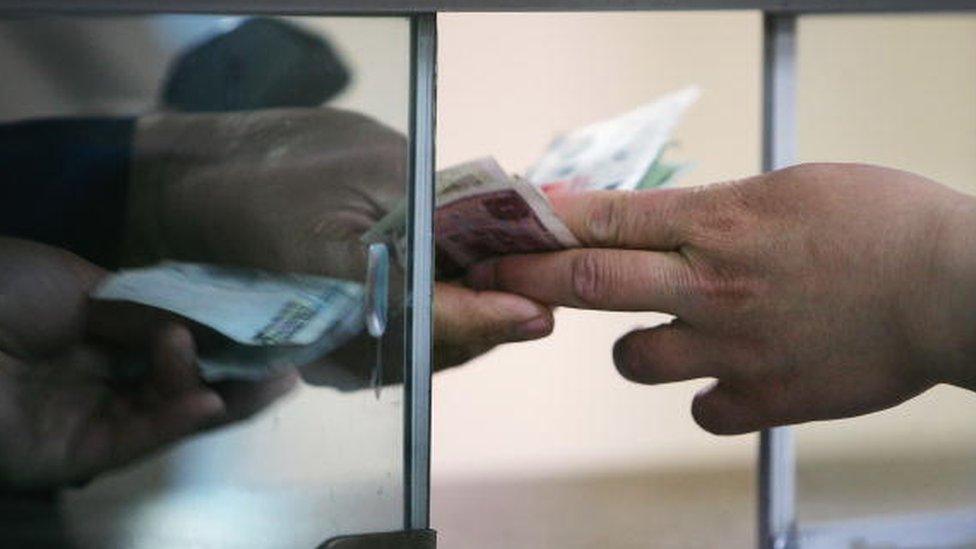China hit by financial scam 'epidemic'
- Published

China is experiencing a growing problem of financial fraud
Li Wenxing was starting a new life. In May, the young university graduate left his home in rural China on the offer of work with a software company in the city of Tianjin.
But the job was a scam and Mr Li was swept into the web of a gang running a pyramid scheme.
Two months later he was dead.
The tragedy, which is being investigated, sparked national outrage and has illuminated the growing problem of financial fraud and its devastating impact on communities in China.
"It's almost an epidemic, especially in rural areas," says Violet Ho, senior managing director at Kroll.
Pyramid schemes
Pyramid schemes are flourishing in parts of the country where education levels are low.
The schemes prey on the vulnerable, typically young people and the elderly, with the promise of employment or lucrative returns for direct sales of products like cosmetics or health supplements.
Victims are assured of great fortune if they recruit more investors into the operation.
"They give the illusion to naive people that they can get rich quickly without risk," says Ms Ho, who investigates financial systems and advises on China.
Peer-to-peer lending and virtual currencies have fuelled the spread of other investing scams, luring victims with little financial knowledge.

Parts of rural China have been particularly hard hit by financial scams
Pyramid - and Ponzi - schemes rely on attracting a constant stream of new investors, and some of the funds raised are paid to earlier backers.
Ms Ho says the Chinese swindles are distinct from frauds typically seen in Western societies due to the lack of sophistication of the investors involved.
Victims have sunk everything they have - borrowing money and even selling their houses - on the promise of even bigger returns.
Chinese social media site Weibo is awash with talk of pyramid schemes. "I've lost count of the people who've been trapped", said one user.
Social problem
It's a social problem the government is fighting to contain.
Victor Shih, associate professor in political economy and China expert at the University of California San Diego, says a combination of factors have spurred the spread of these scams.
"The rapid proliferation of pyramid schemes is caused by high growth in living costs, especially housing costs, which enticed many to look for higher returns - and previously light regulation at the local level," Prof Shih says.
Under pressure to grow their economies, local governments had in the past endorsed some dubious investment schemes - without properly understanding them - on the belief they would deliver strong returns and spur growth.
"Pyramid schemes were [one popular idea] which they thought could keep driving economic growth," says Prof Ning Zhu, deputy dean of the National Institute of Financial Research at Tsinghua University.
"I don't think this is happening any more," he adds.

Low levels of financial literacy in China has helped fuel the spread of pyramid schemes
Government crackdown
Authorities are paying more attention.
The government acknowledges the number of big pyramid scheme cases has shot up, and that organisers are using various channels to lure and cheat unsuspecting Chinese out of their money and assets.
"Pyramid schemes directly harm the market's economic order and social harmony and stability," Beijing said in a recent statement.
China is carrying out three months of co-ordinated action to investigate and clean-up the practice of pyramid selling.
As part of the crackdown, more than 100 arrests were made in southern China last month, targeting individuals over their suspected links to a 360m yuan (£42.3m) pyramid scheme.
Authorities had at least one major bust last year - breaking up a 50bn yuan online finance scam which was suspected of defrauding 900,000 investors.
And while there may be more reaction from the government - the number of pyramid schemes investigated in 2016 jumped 19% on the previous year - the tactics of the con artists at work in China appear to be getting more insidious.

The government says pyramid schemes harm Chinese society
Sinister tactics
Days before Li Wenxing died, the young man reportedly told his family "No matter who calls for money, don't give it to them."
Soon after arriving in Tianjin Mr Li became distant, hard to reach by phone and began asking friends for loans, according to Reuters.
Mr Li was found to have drowned in a small pond outside of Tianjin, the report said. Police said he had been involved in a pyramid scam and investigations are continuing.
Kroll's Violet Ho says the methods like the extortion believed to have been used by the group in Mr Li's case are common.
She says scams in China have become more sinister as organisers illegally detain people and use intimidation tactics on victims, bringing the problem to a "different level".
- Published24 July 2017

- Published1 February 2016

- Published7 March 2016

- Published3 May 2017
